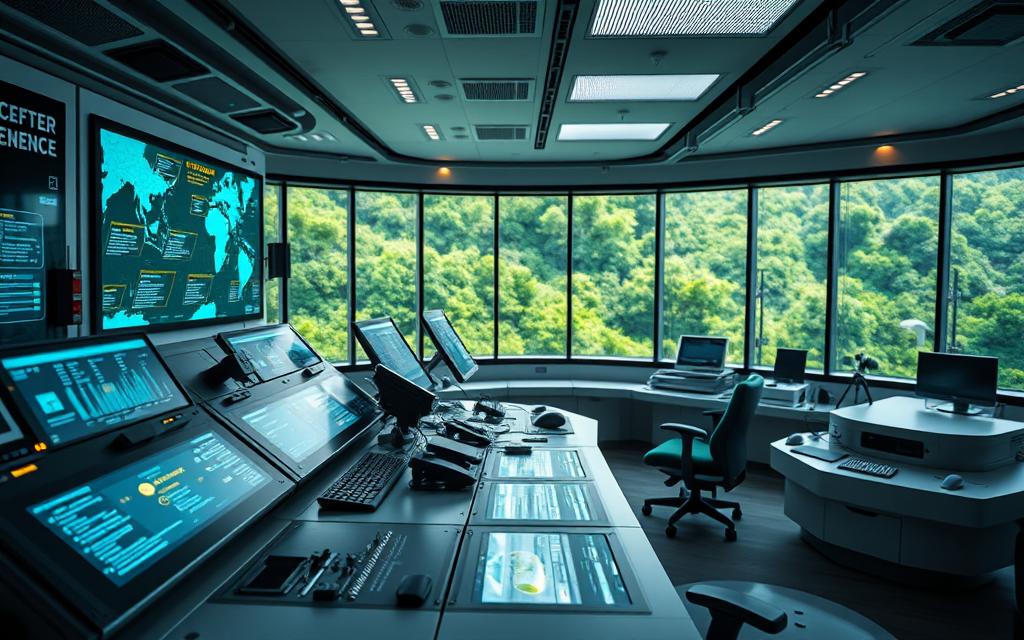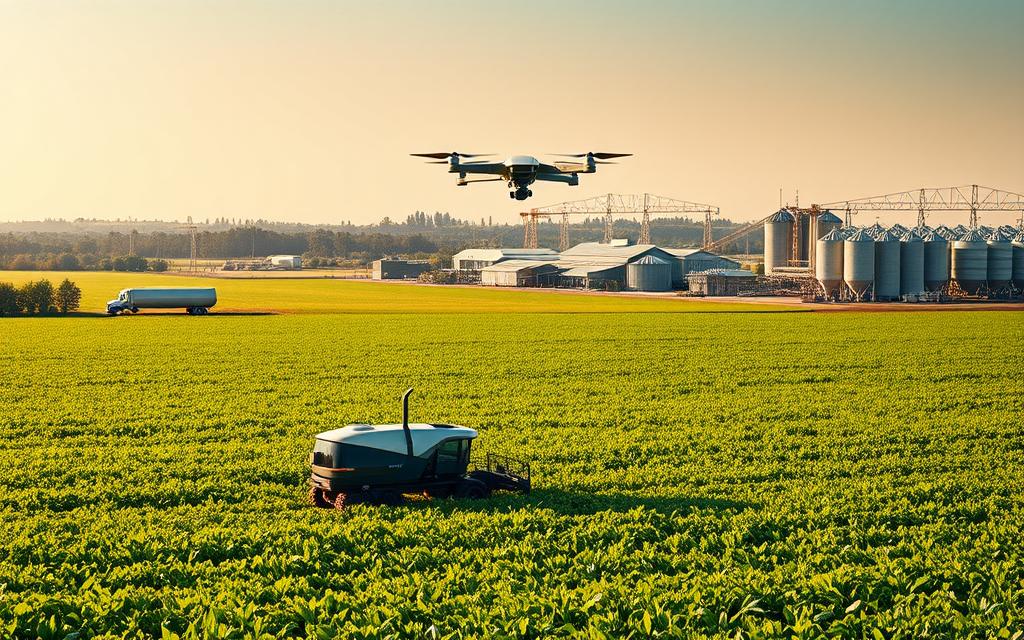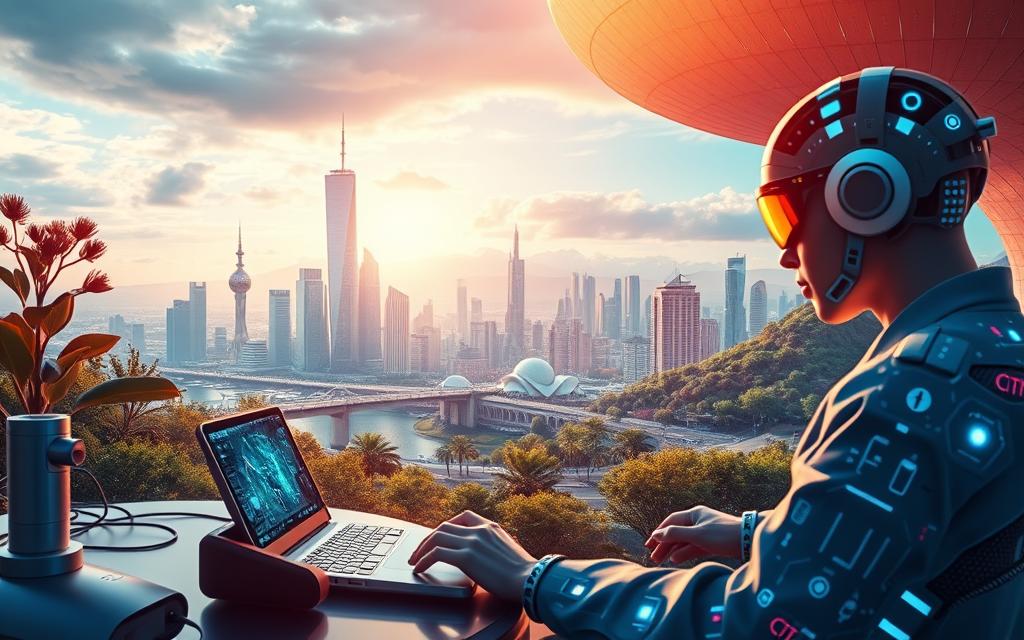Technology is now a big part of our lives. Over 60% of the world’s population uses the internet. More than 6.5 billion people have smartphones. This shows how much innovation has changed our world.
The benefits of technological innovation are huge. They’ve changed healthcare and education. These changes are some of the biggest positive impacts of tech on us.
Technology helps our society grow. It makes life better and boosts the economy. It also connects us all over the world.
The advantages of technology are seen in many areas. They’ve opened up new chances that were unthinkable before. We can expect even more progress in the future.
Transforming Personal Connectivity and Communication
Modern technology has changed how we connect and live our daily lives. It has opened up new ways to interact and manage our homes. These changes were once unimaginable just a few years ago.
Revolutionising Social Interactions
Digital platforms have changed how we connect across the world. They make it easy to talk in real-time, no matter where you are.
Instant Global Communication Platforms
Video calls became key during recent global events. In Spain, 79.53% of people used video calls during lockdown.
This technology breaks down distance barriers. Families separated by oceans can feel like they’re together.
Social networks create communities based on shared interests. They offer support and understanding through groups and forums.
These platforms help us form deep connections. The social media positive effects include less isolation and more social support.
Smart Home Integration and Convenience
Connected home systems have changed our daily lives. They offer practical benefits and improve our quality of life.
Energy Management Through Home Automation
Smart thermostats and lights save energy automatically. They learn our habits and adjust to save energy.
Homeowners save money and help the environment. The smart home benefits include financial savings and being eco-friendly.
Advanced Home Security Systems
Modern security tech offers complete protection. It sends alerts and lets you monitor your home from anywhere.
These systems combine cameras, sensors, and locks. Families can check their home’s security from anywhere using apps.
| Smart Home Feature | Primary Benefit | Average Energy Saving |
|---|---|---|
| Smart Thermostats | Automated temperature control | 10-15% on heating |
| LED Lighting Systems | Adaptive illumination | 75% less energy usage |
| Smart Power Strips | Eliminate phantom loads | 5-10% on electricity |
| Automated Blinds | Natural temperature regulation | Up to 25% on cooling |
These technologies have greatly improved our homes. They make our homes safer, more efficient, and better suited to our needs.
What Are Positive Things About Technology in Modern Healthcare
Technology has changed healthcare a lot, helping people live longer and healthier lives. Life expectancy has gone up from 52.5 years in the 1960s to over 72 years today. This is thanks to new medical technologies.

Medical Diagnostic Innovations
New diagnostic tools are a big plus in healthcare. They help find diseases early and accurately. This was hard to do before.
Artificial Intelligence in Early Disease Detection
AI can look at medical data better than humans. It spots things in images and records that people might miss.
AI can even guess when a disease will start months before symptoms show. This is a big change from just treating diseases to stopping them before they start.
Advanced Medical Imaging Technologies
New imaging tech gives doctors clear views of the body. Scanners make detailed pictures that help doctors make accurate diagnoses without surgery.
| Imaging Technology | Key Benefits | Primary Applications |
|---|---|---|
| MRI Scanners | Non-radiation detailed soft tissue imaging | Neurological disorders, joint injuries |
| CT Scans | Rapid cross-sectional imaging | Trauma assessment, cancer detection |
| PET Scans | Metabolic activity monitoring | Oncology, neurological disorders |
| Ultrasound | Real-time imaging without radiation | Pregnancy monitoring, abdominal issues |
Telemedicine and Remote Care Solutions
Remote healthcare has made it easier for people to get medical help. Those in remote areas can now talk to specialists without leaving home.
Increasing Healthcare Accessibility Worldwide
Telehealth connects patients with doctors everywhere. It’s been very helpful during the COVID-19 pandemic. It keeps care going while keeping people safe.
The fast work on vaccines showed how tech can save lives. Quick teamwork and new ways to make vaccines stopped many illnesses and deaths.
Remote Patient Monitoring Systems
Wearable devices send health info to doctors. This lets them know if something is wrong before it gets serious.
Devices like glucose monitors and smart inhalers send health data in real-time. This helps doctors give better care and catch problems early.
Telemedicine is not just convenient. It really helps people get better. It makes it easier for patients to follow treatment plans.
Remote care also helps older people stay independent longer. These benefits are just the start of how tech will change healthcare.
Educational Transformation Through Digital Technologies
Digital innovation has changed how we learn and get knowledge. The classroom now goes beyond physical walls, opening new doors for students everywhere.
Digital Learning Platforms Revolution
Today’s education uses digital platforms for flexible, personal learning. These tools turn old teaching ways into lively, interactive paths.
Massive Open Online Courses (MOOCs)
MOOCs make top education available to all. Sites like Coursera and edX offer courses to millions, with 49% of students worldwide taking one.
These courses break down money and location barriers, opening elite education to many.
Interactive Educational Software Development
Educational software makes learning fun and keeps it in mind. It boosts creativity in 90% of students.
It also makes students work better, with 80% of leaders seeing big improvements in their work.
Global Classroom Connectivity
Technology links the world, making learning environments that help students work together globally.
Breaking Down Geographical Educational Barriers
Digital tools remove location limits, letting rural and under-served areas get quality education. Virtual classrooms let students learn from experts, no matter where they are.
This is a big online education advantage in today’s learning world.
International Collaborative Learning Programmes
Students now work on projects with others from around the world. These projects help students see the world from different views and understand cultures.
Tools for real-time collaboration make projects and cultural exchanges possible that were once out of reach.
Environmental Sustainability Through Technological Innovation
Technology has its costs, but it’s key for saving our planet. New green technology is making big strides in protecting our environment and managing resources better.

Renewable Energy Technological Advances
The renewable energy field has seen big leaps forward. These changes are vital for cutting down carbon emissions and moving to cleaner energy.
Solar Power Efficiency Breakthroughs
Solar panels have gotten much better thanks to new materials and designs. Now, perovskite solar cells turn sunlight into electricity more efficiently than ever. Bifacial panels even catch energy from both sides.
Production methods have also become greener, cutting down environmental harm. This makes solar energy cheaper and more accessible for everyone.
Wind Energy Technological Improvements
Wind energy tech has grown with bigger, more efficient turbines. These turbines can handle stronger winds at higher altitudes. Smart blades adjust to wind conditions, capturing more energy while harming less.
Offshore wind farms now use floating platforms to reach deeper waters. This opens up new areas for energy generation. These steps are big wins for sustainable technology benefits in energy production.
| Technology | Efficiency Gain | Environmental Impact Reduction | Implementation Scale |
|---|---|---|---|
| Perovskite Solar Cells | 35% increase | 40% lower carbon footprint | Commercial deployment |
| Smart Wind Turbines | 28% more output | Reduced bird strikes | Large-scale farms |
| Bifacial Solar Panels | 22% additional yield | Less land usage | Utility and residential |
| Floating Wind Platforms | Access to deeper waters | Minimal seabed disruption | Offshore expansion |
Environmental Monitoring Systems
Advanced monitoring tech gives us vital data for protecting our environment. These systems offer real-time insights into how our ecosystems are doing.
Satellite-Based Ecosystem Tracking
Satellites now give us high-resolution images to track deforestation, glacial retreat, and urban growth. They cover vast areas that would be hard to survey on the ground.
This data helps governments and groups make better conservation choices. It’s a big step forward in environmental technology.
AI-Assisted Wildlife Conservation Efforts
AI algorithms look at camera trap images and sound data to spot species and track their numbers. They process huge amounts of data to find patterns we might miss.
These tools help protect endangered species and their homes better. Conservation teams can act quicker to threats with these smart tools.
These technologies show how innovation helps keep our planet balanced. The sustainable technology benefits are key to tackling today’s environmental challenges.
Workplace Efficiency and Technological Integration
Today, companies use digital tools to make work better. They turn old work places into new, efficient ones. This change has changed how businesses work, talk, and reach their goals.
Automation and Productivity Tools
Automation is key for better work. It makes tasks easier, so people can focus on growing the business.
Advanced Project Management Software
Tools like Asana and Trello help manage big projects. They let teams work together, track progress, and share resources.
Managers can see how projects are doing easily. This tech cuts down on paperwork and helps meet deadlines.
AI-Powered Data Analysis Systems
AI has changed how we use data. It looks at big data to find patterns and trends. This helps make better decisions.
Using AI, companies can plan better and stay ahead. It helps avoid mistakes and risks.
Remote Work Technological Solutions
Remote work has become more common thanks to digital tools. This has led to better ways to talk and work together.
Video Conferencing Platform Developments
Tools like Zoom and Microsoft Teams do more than just calls. They have cool features like virtual backgrounds and live transcriptions.
These tools make meetings feel real, even if you’re far apart. They keep teams connected and strong.
Cloud-Based Collaboration Tools
Cloud tech makes sharing and editing documents easy. Google Workspace and Microsoft 365 let everyone work on the latest version of files.
These tools help teams work faster and avoid mistakes. They make it easy to work together, no matter where you are.
Transportation Technological Revolution
The world of transport is changing in a big way, like never before. It’s not just about getting from one place to another. It’s changing how we think about moving, building cities, and planning our journeys. New tech is making travel cleaner, safer, and more efficient for everyone.
Electric Vehicle Innovations
Electric cars are leading the transport revolution. They’re no longer just for a few. Now, they’re becoming a common choice, thanks to their green benefits and cost savings.
Battery Technology Advancements
Batteries are key to electric cars. New tech has made them better, allowing cars to go over 300 miles on one charge. The next big thing is solid-state batteries, promising even more efficiency and safety.
Car makers have also made electric cars cheaper. This is making them more affordable for everyone. It’s helping more people switch to electric, across all income levels.
Charging Infrastructure Development
Charging stations are growing fast. Now, you can charge up to 80% in just 30 minutes. Wireless charging is also being tested, which could make charging even easier.
Smart charging systems help use energy wisely. They adjust to the grid’s needs, reducing strain during busy times. This is a big step towards using energy better in transport.
Smart Transportation Systems
Technology is changing how transport networks work. Smart systems use data and AI to make cities move better. This benefits everyone using the roads.
Traffic Management Optimisation Technologies
Advanced systems use real-time data to manage traffic. They can cut congestion by up to 20%. This means less time stuck in traffic and fewer emissions.
These systems can predict traffic patterns. They use data on events and weather to plan ahead. This is a big change in how cities are planned.
Autonomous Vehicle Safety Features
Self-driving cars have many safety features. They use sensors, AI, and communication with other cars. These features work together to prevent accidents.
These systems greatly reduce accidents caused by humans. As they improve, they will make roads safer for everyone.
| Technology Type | Current Implementation | Projected Impact | Key Benefits |
|---|---|---|---|
| Battery Electric Vehicles | Mainstream adoption | 50% market share by 2030 | Zero emissions, lower operating costs |
| Autonomous Driving Systems | Limited commercial deployment | Full autonomy by 2040 | Accident reduction, mobility access |
| Smart Traffic Management | Major urban areas | Nationwide integration | Congestion reduction, emission control |
| Wireless Charging | Pilot programs | Standard feature by 2035 | Convenience, infrastructure simplification |
The transport revolution is speeding up. We’re moving towards a future where travel is cleaner, safer, and more efficient. These changes are good for the planet and make our lives better by reducing traffic and improving mobility.
Agricultural Technological Breakthroughs
Modern agriculture is leading the way in technology, changing how we grow and manage food. These new methods tackle big challenges like using less resources and caring for the environment. They also make farming more productive.

Precision Farming Techniques
Precision farming uses data to improve crop production. It uses the latest tech to make farming better.
GPS-Guided Agricultural Equipment
GPS has made farm machines smarter. Now, tractors and harvesters can move around fields with great accuracy.
This accuracy means less waste and more efficient use of resources. Farmers save a lot on fuel and cut costs while covering more ground.
Drone-Based Crop Monitoring Systems
Drones give farmers a new view of their crops. They take detailed pictures and data from above.
These drones spot problems early, like stress or disease. Farmers get important info before they can see it themselves.
Sustainable Agriculture Technologies
Today, farming focuses on being sustainable. New tech helps farms be productive while being kind to the planet.
Water Conservation Irrigation Systems
Smart irrigation is a big step in managing water. It uses sensors and weather info to water crops just right.
Techniques like drip irrigation save a lot of water. Farmers keep their crops watered well while using less.
Vertical Farming Innovations
Vertical farming changes how we use space for growing food. It stacks layers of plants in cities.
LED lights and controlled environments help plants grow all year. This method uses less resources and produces food constantly.
| Technology Type | Key Benefits | Implementation Scale | Environmental Impact |
|---|---|---|---|
| GPS-Guided Equipment | Precision planting, reduced overlap | Large-scale farms | Lower fuel consumption |
| Drone Monitoring | Early problem detection | All farm sizes | Reduced chemical use |
| Smart Irrigation | Water conservation | Variable scales | Water resource preservation |
| Vertical Farming | Year-round production | Urban environments | Reduced land use |
These tech breakthroughs show how innovation improves farming. They make farming better for the planet and for people.
As tech keeps getting better, farming will be more precise and green. The future of farming looks bright, with a focus on sustainability and feeding more people.
Entertainment and Media Technological Evolution
The digital revolution has changed how we enjoy entertainment. It gives us easy access to lots of content and introduces new immersive technologies. This change is one of the biggest in our lives.

Streaming Services and Content Accessibility
Streaming platforms have broken down barriers, letting us watch content from anywhere. Video and audio streaming now make up about 70% of all internet traffic. This shows the internet is our main source of entertainment.
Global Content Distribution Platforms
Platforms like Netflix, Disney+, and Amazon Prime Video have made entertainment global. They let creators reach people worldwide, skipping old ways of getting content out. This change in how we watch media is big.
Personalised Media Recommendation Algorithms
Algorithms use our viewing habits to suggest content just for us. They learn from:
- What we’ve watched and for how long
- Our favourite types of content
- When we watch
- What’s popular and trending
This makes our entertainment experience unique, adding value to streaming services.
Immersive Experience Technologies
Technology has brought us immersive experiences that mix digital and real worlds. These are the latest in entertainment tech.
Virtual Reality Entertainment Applications
VR has grown beyond gaming to include many types of entertainment. Modern VR offers:
- Immersive movies with 360-degree views
- Virtual concerts where you feel like you’re there
- Fun, interactive learning experiences
- Places to meet and share virtual experiences
VR is getting cheaper, making these experiences available to more people.
Augmented Reality Practical Uses
AR adds digital info to our world, creating new experiences. It’s changing things in many areas. According to research on digital technology’s impact, AR is making:
- Museums and galleries more interactive
- Live events more engaging with extra info
- Shopping better with virtual try-ons
- Learning more fun with interactive materials
VR and AR are getting better, promising even more exciting entertainment in the future.
Financial Technology Advancements and Inclusion
The digital revolution has changed how we handle money, making it easier and safer. Over 2.14 billion people bought things online in 2021. Financial technology has become key to our lives, bringing many fintech benefits beyond just ease.

Digital Banking Revolution
Digital banking has changed financial services, giving us 24/7 access to our money. It removes the need to be in one place. Now, we can check balances and send money easily, all from our phones or computers.
Mobile Payment System Developments
Mobile payments have grown a lot, letting us pay with just a tap or scan. Apple Pay, Google Wallet, and bank apps are making cash and cards less needed. They offer both ease and better security.
Blockchain and Secure Transaction Technologies
Blockchain is a big step forward in keeping transactions safe. It creates digital records that can’t be changed. This tech makes transactions secure and builds trust in digital finance, helping it grow.
“Blockchain technology is not just about cryptocurrencies; it’s about creating transparent, secure systems that revolutionise how we verify and record transactions.”
Investment and Trading Technologies
New tech has made it easier for everyone to invest, not just the rich. This is a big step towards financial technology inclusion. It’s breaking down old barriers to investing.
Algorithmic Trading Platform Innovations
Algorithmic trading uses math to make trades at the best times and prices. These systems look at market data fast, making choices humans can’t. They’re based on huge amounts of data.
Robo-Advisors and Financial Planning Tools
Robo-advisors have changed how we manage our money. They offer automated financial advice with little human help. These tools give:
- Personalised investment advice
- Automatic adjustments to your portfolio
- Lower fees than traditional advisors
- Investing options for beginners
| Technology Type | Key Benefits | Accessibility Impact |
|---|---|---|
| Mobile Payment Systems | Instant transactions, reduced fraud risk | High – available to smartphone users |
| Blockchain Technology | Immutable records, enhanced security | Medium – requires technical understanding |
| Algorithmic Trading | Optimised execution, emotion-free decisions | Medium – mainly for institutions |
| Robo-Advisors | Low-cost investing, automated management | High – open to most investors |
Financial tech keeps getting better, letting more people safely join the global economy. These advances are not just tech progress. They’re steps towards financial freedom for many worldwide.
Space Exploration and Satellite Technology Progress
Exploring space is a huge achievement in technology. It’s now open to science and business, showing the space technology benefits are vast.
Commercial Spaceflight Developments
The space industry has changed a lot. It’s now more about private companies than government. This change has brought new ideas and lower costs.
Reusable Rocket Technology Breakthroughs
Spacecraft can now be reused, thanks to new engineering. Companies like SpaceX have shown it’s possible to launch, recover, and launch again.
This breakthrough cuts down costs and increases how often we can launch. It also helps the environment by reducing waste.
Space Tourism Initiative Progress
Space travel for civilians is now real. Companies are taking people on short flights, with plans for longer trips soon.
This opens space to more people, inspiring and funding new tech. The commercial spaceflight area is growing fast.
Earth Observation and Climate Monitoring
One big satellite technology advantage is watching Earth. Satellites give us insights we can’t get from the ground.
Weather Prediction Technological Advances
Weather forecasting relies on satellites. They track storms, moisture, and temperatures worldwide.
This has made forecasts much better. It helps save lives and money by preparing for bad weather.
Environmental Change Tracking Systems
Satellites track changes on Earth. They measure ice, forests, and oceans with great detail.
This data helps scientists and policymakers. It guides efforts to protect our planet based on real data.
The space technology benefits are huge. They help us explore and protect our planet. Looking up helps us take care of our home.
Conclusion
Technology has changed the world in many ways. It has brought new ideas to healthcare, like telemedicine. It has also changed how we learn, thanks to digital platforms.
Technology makes our lives better and helps solve big problems. It helps us live more sustainably and work more efficiently. It also makes travel and farming better.
The future of technology looks bright. It will help us explore space and understand our planet better. It will also make banking and entertainment more accessible and fun.
We need to use technology wisely. We must think about its impact and use it for good. Technology is a powerful tool that can help us grow and innovate.
FAQ
How has technology improved communication and social interactions?
Technology has changed how we talk to each other. Now, we can chat instantly with people all over the world using WhatsApp and Zoom. This was really important during the COVID-19 pandemic.
Social media like Facebook and Twitter also help us connect. They create communities and support networks. This lets us talk to people across continents in real-time.
What are the benefits of smart home technology?
Smart homes make life easier and more efficient. Systems like Google Nest and Amazon Alexa help manage energy. They turn lights and heating on and off automatically.
They also make homes safer. With devices like Ring doorbells, you can watch your home live. This gives you peace of mind.
How is technology positively impacting healthcare?
Technology is bringing big changes to healthcare. AI helps find diseases early. And tools like MRI scanners give doctors clearer pictures.
Telemedicine, like Babylon Health, makes healthcare more accessible. It’s great for people in remote areas. This helps everyone stay healthier and live longer.
In what ways has technology transformed education?
Technology has made education available to everyone. Sites like Coursera and edX offer top-quality courses online. This lets people from all over the world learn together.
Interactive software and global classrooms break down barriers. They help students get ready for a world that’s more connected than ever.
How does technology support environmental sustainability?
Technology is key to saving our planet. It helps make renewable energy better, like solar panels and wind turbines. This means we use less harmful energy.
It also helps protect our environment. Systems like satellite tracking and AI in conservation keep ecosystems safe. This is vital for our planet’s future.
What positive impacts does technology have on the workplace?
Technology makes work better and more efficient. Tools like Asana help manage projects. AI systems analyze data to help make decisions.
Remote work tools, like Zoom and Microsoft Teams, let teams work together from anywhere. This changes how we work today.
How is technology revolutionising transportation?
Electric cars are changing how we travel. Companies like Tesla are making batteries better. This means electric cars can go further.
Smart traffic systems use technology to make roads safer and less crowded. They help reduce accidents. And soon, cars might drive themselves.
What role does technology play in modern agriculture?
Technology makes farming better and more sustainable. It uses GPS and drones to check crops. This helps farmers grow more food with less water.
It also helps save water and reduce waste. New ways of farming, like vertical farming, are kinder to the planet.
How has technology evolved entertainment and media?
Technology has changed how we enjoy entertainment. Streaming services like Netflix and Spotify give us access to lots of content. They even suggest shows and music we might like.
Virtual Reality (VR) and Augmented Reality (AR) take entertainment to new levels. They make games and experiences more real and fun.
What are the benefits of financial technology (fintech)?
Fintech makes money matters easier. Digital banking and mobile payments, like Apple Pay, are convenient. They make managing money simpler.
Blockchain technology adds an extra layer of security. It helps protect our money. And tools like Nutmeg make investing easier for everyone.
How is technology advancing space and satellite applications?
Technology is pushing space exploration forward. Companies like SpaceX are making rockets reusable. This makes space travel cheaper and more accessible.
Satellites are important for Earth observation. They help us understand the weather and track environmental changes. This is key for science and keeping us safe.







